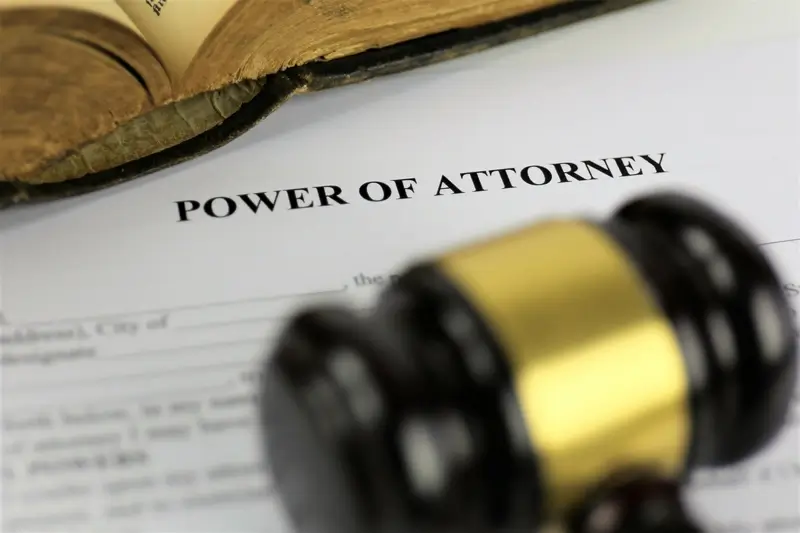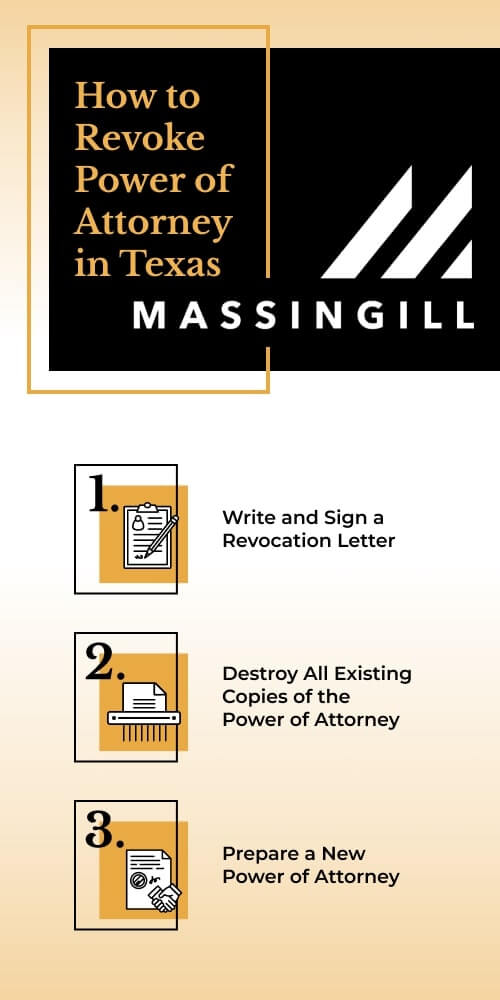
A power of attorney is a legal document that grants decision-making authority to someone (the agent) on behalf of another person (the principal).
Depending on the terms of the document, the agent has the ability to access information and accounts and make life-altering decisions for the principal.
Unfortunately, there are situations when the agent fails to use their power properly or is no longer suitable for the role and needs to be removed.
In this blog, the Massingill team explains how to revoke a power of attorney in Texas.
If you have any questions, please contact us today online or call 512-872-4693. Our estate planning lawyers are ready to help.
What Is a Power of Attorney?
A power of attorney (POA) is a powerful and commonly used estate planning tool.
There are different types of powers of attorney, and they can be used for making financial and medical decisions.
The principal determines the agent’s level of authority by clearly spelling out the terms in the document.
For example, your agent can have limited power to close on a property for you while you’re on an extended vacation.
Or you can give your agent broad authority to handle all of your financial affairs during your lifetime, even if you become incapacitated.
This second example refers to a durable power of attorney and is most often used in a person’s estate plan.
Can I Revoke a Power of Attorney?
As the principal, you have the right to revoke a power of attorney as long as you’re physically and mentally able.
In some instances, like death and divorce, a power of attorney automatically terminates.
When Should I Consider Revoking a Power of Attorney?
There are plenty of reasons for revoking a power of attorney. Maybe the agent is no longer able to fulfill their duty.
In more serious cases, a principal will want to terminate the agent’s powers because of a breach of fiduciary duty or financial elder abuse.
How to Revoke a Power of Attorney

Revoking a power of attorney is relatively simple. You don’t need to go to court or wait a certain time period to revoke the document.
In Texas, there are three ways to effectively revoke a power of attorney.
Write and Sign a Revocation Letter
A revocation letter is a written document that clearly states you are revoking the power of attorney that you created on a certain date.
You want to sign the letter in front of a notary public and record it with the county clerk in the county where you reside.
The letter should be sent via certified mail or hand-delivered to the agent.
It’s also important that you provide copies of the revocation to every person and entity that your agent interacted with on your behalf so that they have notice of the revocation.
This includes any banks or financial institutions where you own assets, real estate agents, landlords, doctors, taxing authorities, family members, etc.
Destroy All Existing Copies of the Power of Attorney
Destroying a power of attorney only revokes the document if the agent never knew about the document nor had a copy presented to them.
Think about it—if you destroy your original and whatever copies you have on hand, but the agent still has his own copy, it’s still valid.
That’s why we emphasize writing and signing a revocation letter and providing copies to the agent and all other persons and entities who might be affected.
Prepare a New Power of Attorney
You can revoke a power of attorney by creating a new one. You want to include language that states that all prior powers of attorney have been revoked.
By doing this, the new power of attorney supersedes any other power of attorney document.
How Do You Prove Power of Attorney Abuse?
Although your agent should be someone you trust, it’s not uncommon for agents to abuse their power.
Abuse can come in many forms, but it often occurs when the principal becomes incapacitated, and the agent takes advantage of the principal.
The clearest and easiest way to prove abuse of a power of attorney is through financial records.
Agents have a fiduciary duty to act in the principal’s best interest, which means they cannot personally benefit from the principal’s assets.
A paper trail showing the agent taking money from the principal’s account is evidence of power of attorney abuse.
Contact a Texas Estate Planning Lawyer Today
A power of attorney is an incredibly helpful document when properly used. If your agent is abusing their authority or not acting in your best interest, it is time to revoke that power.
At Massingill, an experienced Texas estate planning lawyer can help you prepare a revocation letter and create a new power of attorney document.
Our goal is to make the process as seamless and simple as possible. We achieve this by combining our legal experience and collaborating as a team.
With over 150 5-star reviews on Google, we continue to bring exceptional service to our clients.
Call our office at 512-872-4693 or contact us online to schedule a consultation via phone, video, or in person.



